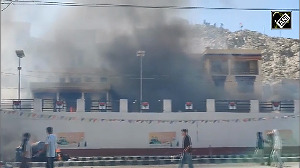The Andhra Pradesh government on Wednesday decided to promulgate an ordinance to provide four percent reservations to 15 groups of 'socially and educationally backward' Muslims in professional educational institutions and public employment with effect from the current academic year.
Briefing media persons after the State cabinet meeting, Minister for Information and Public Relations Anam Ramnarayan Reddy said, "The government of Andhra Pradesh has been deeply committed to the cause of providing social justice to the socially and educationally backward classes among Muslims."
The government had earlier provided five percent reservations to the entire Muslim community (excluding creamy layer) but the Andhra Pradesh High Court had struck down the quota twice.
One of the main reasons for quashing the quota was that the overall reservations for Scheduled Castes, Scheduled Tribes and Backward Classes would exceed the ceiling of 50 per cent prescribed by the Supreme Court.
"The principle of exclusion of socially advanced persons/sections (that is, creamy layer) already laid down by the state government will automatically and naturally apply to the classes now recommended for inclusion in the list of Backward Classes," the minister added.
This is the third time the Andhra Pradesh government has earmarked reservations for Muslims. In July 2004, the Congress government had issued a Government Order earmarking five percent quota for Muslims through their inclusion in the list of Backward Classes. But the GO was quashed by the AP High Court on a petition filed by Sangh Parivar activists.
Again, in June 2005, the state government promulgated an Ordinance providing five percent quota for Muslims.
The Ordinance was replaced by an Act subsequently. Admissions were made for professional courses on the basis of this quota.
However, the high court struck down the quota for Muslims and allowed a batch of writ petitions. The state government filed a special leave petition in the Supreme Court against the high court's judgment, which is still pending.





